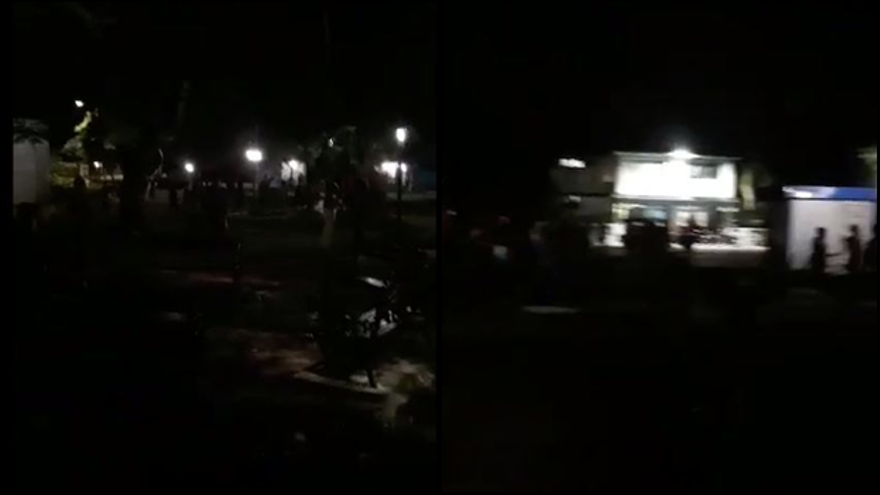
![]() 14ymedio, Juan Izquierdo, Havana, 15 August 2022 — Two night protests against the blackouts took place this weekend in the neighborhood of El Condado, in Santa Clara. Neighbors took advantage of the darkness to shout and beat on saucepans in front of the dreaded Fifth Unit Police Station
14ymedio, Juan Izquierdo, Havana, 15 August 2022 — Two night protests against the blackouts took place this weekend in the neighborhood of El Condado, in Santa Clara. Neighbors took advantage of the darkness to shout and beat on saucepans in front of the dreaded Fifth Unit Police Station
A video that circulated on Sunday on several social networks shows dozens of people shouting slogans in a park located on Estrada Palma Street, in the vicinity of the police station.
“El Condado is a prioritized circuit,” Enrique, a resident in the center of Santa Clara, tells 14ymedio, “and the Electrical Union avoids taking away the power. On Saturday they did it for the first time in some time, and people protested. After half an hour they reestablished service. Yesterday, not too late at night, the same thing happened.”
“That neighborhood is the trigger,” he explains. “If El Condado explodes, the whole city will follow.” He points out that the most significant thing about the protests is that they occurred “for the Police to see,” and in front of the Fifth Unit, which has the reputation of handling any incident in El Condado with a “strong hand.”
A recent example of this, Enrique recalls, was the death of the young Zinédine Zidane Batista, 17, at the hands of a police officer. In the middle of a fight, Batista was neutralized by an officer and shot several times, including once in the chest, which ended his life. Although El Condado is characterized by the people of Santa Clara as a “marginal” neighborhood, this episode of violence deeply moved the residents of the city. continue reading
To the discomfort caused by the repression are added the constant blackouts and the difficulty in obtaining food and basic products, even when this neighborhood of Santa Clara also functions as the center of the city’s informal market.
An article published in the local newspaper Vanguardia, on August 11, informed the people of Santa Clara that they would undergo a “rotation of the four energy blocks” to “distribute” the “effects” of the electric service.
The article specified that the province had “300,000 residential customers distributed on 159 circuits,” of which several receive “protection,” such as circuit 3, in the center of Santa Clara, “where services committed to the population are offered, in addition to radio and television transmitters, banks and ATMs.”
In addition, the provincial government announced two “proposals” for the planning of blackouts. “The first proposal consists of 12 hours divided into two periods of time, and the second, of up to 12 continuous hours, whose interruption time could be shorter depending on the conditions of the National Electricity System.”
The “new system of effects” began on Saturday, August 13, coinciding with the protests in El Condado. Some of the comments of readers, outraged by the article, escaped censorship by the Communist Party, of which Vanguardia is the provincial press organ.
“Are we a national vanguard in blackouts? Why are they so unfair to some and accommodating to others? Are we third-rate citizens?” asked one reader. “Impossible,” said another, “we can’t take it anymore. How long? They do repairs, maintenance, and when they start getting back up on the system they have problems again. The issue of programming, keep it in mind, is abusive. We went back to the years of the Special Period.”
“People are very upset in every way,” Enrique tells 14ymedio, “but the Government has been able to regulate the ’pressure’. In reality, very few people in Santa Clara dare to go out on the street, and those who do immediately give in when they turn on the power.”
“In my neighborhood,” the man continues, “very close to the city center, when the light goes out there are three ’security’ women who go out to see what people say. They have children abroad and their cards are loaded with dollars, a very comfortable position to be in for a ’snitch’. Recently, in the middle of a blackout, the banging on two pots and pans rang down the street, and they immediately went out to see what was going on. There are people like that in every neighborhood.”
Night protests against blackouts are becoming more frequent on the island. The explosion at the Matanzas Supertanker Base, on August 5, was a bad omen for a country that was already in the middle of a crisis. Since the night demonstrations against an energy cut in Los Palacios, Pinar del Río, on July 15, this type of protest has been repeated in dozens of towns and cities on the island.
During the most recent ones, in Güira de Melena, in the province of Artemisa, neighbors took to the streets with pots and pans, shouting “Turn on the power, dickhead,” a slogan that has become common to demand an end to the blackouts.
Translated by Regina a Anavy
____________
COLLABORATE WITH OUR WORK: The 14ymedio team is committed to practicing serious journalism that reflects Cuba’s reality in all its depth. Thank you for joining us on this long journey. We invite you to continue supporting us by becoming a member of 14ymedio now. Together we can continue transforming journalism in Cuba.

